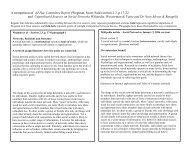Strange Scholarship in the Wegman Report - Get a Free Blog
Strange Scholarship in the Wegman Report - Get a Free Blog
Strange Scholarship in the Wegman Report - Get a Free Blog
Create successful ePaper yourself
Turn your PDF publications into a flip-book with our unique Google optimized e-Paper software.
<strong>Strange</strong> <strong>Scholarship</strong> <strong>in</strong> <strong>the</strong> <strong>Wegman</strong> <strong>Report</strong> V1.0 09/26/10<br />
Memes and Themes<br />
The WR repeats many well-cataloged climate anti-science Memes. They<br />
may be directly stated <strong>in</strong> <strong>the</strong> WR, quote-m<strong>in</strong>ed, amplified or <strong>in</strong>directly<br />
supported via uncited, irrelevant references act<strong>in</strong>g as meme-carriers.<br />
Such Memes may not be obvious to <strong>the</strong> reader unfamiliar with climate antiscience,<br />
but experienced watchers see <strong>the</strong>m often. But it is strange to f<strong>in</strong>d<br />
<strong>the</strong>m pervad<strong>in</strong>g an ―expert, objective, <strong>in</strong>dependent‖ report to Congress,<br />
especially from statisticians with no obvious experience do<strong>in</strong>g such.<br />
Skeptical Science offers a convenient numbered list of climate anti-science<br />
arguments. Each has a short description l<strong>in</strong>ked to a general-audience<br />
description and debunk<strong>in</strong>g. Peer-reviewed literature is cited as backup.<br />
www.skepticalscience.com/fixednum.php<br />
The subset used here is listed on <strong>the</strong> second follow<strong>in</strong>g page. The WR uses<br />
some o<strong>the</strong>rs enough to assign Meme letters, most of <strong>the</strong>se appear <strong>in</strong> some<br />
form <strong>in</strong> MM05x, McK05, GMI2005, or at McIntyre‘s website.<br />
Meme-a❶ IPCC results depend ma<strong>in</strong>ly on 1999 hockey stick<br />
Sen. Inhofe was say<strong>in</strong>g this by 02/10/05 [GMI2005, p.10].<br />
Meme-b❶ Paleoclimate peer review is poor, due to social network<br />
McIntyre has history of promot<strong>in</strong>g Memes -b and -c <strong>in</strong> his blog, but<br />
<strong>the</strong> ideas may have started with Michaels at GMI [GMI2003, p.10]:<br />
―Question: Pat Michaels, University of Virg<strong>in</strong>ia. I th<strong>in</strong>k what you‘re<br />
really uncover<strong>in</strong>g here is a larger and pervasive problem <strong>in</strong> science,<br />
which is <strong>the</strong> peer-review process seems to be miss<strong>in</strong>g important and<br />
obvious issues, perhaps fail<strong>in</strong>g because of <strong>the</strong> sociology of global<br />
warm<strong>in</strong>g science.‖<br />
MM were thus ―coached‖ by real experts like Michaels and S<strong>in</strong>ger.<br />
―Groupth<strong>in</strong>k‖ discussion appears May 2005, <strong>in</strong> McK05 <strong>the</strong>n MM05x<br />
for GMI. These sources are referenced (vaguely) <strong>in</strong> WR, not cited.<br />
Meme-c❶ No <strong>in</strong>dependent verification, s<strong>in</strong>ce some data shared‖<br />
This one claims data same, MM05x, p.17. W.8.9.<br />
Meme-d❶ It‘s a few bad scientists<br />
Attacks often focus on a few, or ma<strong>in</strong>ly one scientist at a time. Targets<br />
have been Ben Santer (IPCC SAR), Michael Mann (TAR), and Phil<br />
10<br />
Jones (―Climategate,‖ perhaps AR4). Misattribution of multi-person<br />
efforts to <strong>in</strong>dividuals is effective <strong>in</strong> personify<strong>in</strong>g results, yield<strong>in</strong>g easier<br />
targets compared to larger organizations. All have been repeatedly<br />
called crim<strong>in</strong>als, attacked <strong>in</strong> OpEds and been threatened with violence.<br />
Meme-e❶ Confound<strong>in</strong>g factors everywhere<br />
‖Confound<strong>in</strong>g factors‖ are always impediments for which statisticians<br />
stay alert, A.8.When experts identify such factors and expla<strong>in</strong> methods<br />
of deal<strong>in</strong>g with <strong>the</strong>m <strong>in</strong> numerous papers, amateurs add no value by<br />
label<strong>in</strong>g anyth<strong>in</strong>g <strong>the</strong>y do not understand as ―confound<strong>in</strong>g factors.‖ This<br />
may impress people unfamiliar with <strong>the</strong> field, but not experts. Bradley<br />
(1999) spends hundreds of pages to deal with such issues, but <strong>the</strong> WR<br />
<strong>in</strong>serts extra ―confound<strong>in</strong>g‖ several times <strong>in</strong>to plagiarized text.<br />
Meme-f❶ Faux fight between statisticians and climate scientists<br />
Some parts of <strong>the</strong> WR and follow-on‘s, like [WEG2006c, SHA2006,<br />
WEG2007, SAI2008] almost seem attempts to create fights between<br />
statistics and climate science establishments. Climate scientists and<br />
statisticians have often had fruitful collaborations and <strong>in</strong>terchanges,<br />
especially when <strong>the</strong> former know to ask for help and <strong>the</strong> latter take time<br />
to learn enough science, A.4.<br />
Meme-g❶ General problem applies to all specific cases<br />
Confound<strong>in</strong>g factors, miss<strong>in</strong>g data, data errors, PCA-decenter<strong>in</strong>g,<br />
suboptimal statistical methods and poor peer-review are all real<br />
problems, but may or may not apply <strong>in</strong> any given case. Label<strong>in</strong>g<br />
unfamiliar specifics as <strong>in</strong>stances of familiar general problems is<br />
effective <strong>in</strong> rais<strong>in</strong>g doubts, except with experts who know better, A.4.<br />
Bad talks or papers seek unwary audiences.<br />
Meme-h❶ We‘re statisticians, only asked to look at statistics, MBH99<br />
This sometimes appears, seem<strong>in</strong>gly to avoid o<strong>the</strong>r discussions, as of<br />
basic science or all <strong>the</strong> later papers, especially <strong>in</strong> testimony.<br />
Meme-j❶ Large uncerta<strong>in</strong>ty means almost noth<strong>in</strong>g is known<br />
This is a more general form of Meme-e❶, specifically added for A.12,<br />
McShane, Wyner (2010), although its antecedents may lie <strong>in</strong><br />
McIntyre‘s long efforts to denigrate every mean<strong>in</strong>gful proxy.



